In This Episode << SLIDE LEFT TO SEE ADDITIONAL SEGMENTS
Education Justice
KRISTIN CORNWELL (Teacher, Hanley Elementary School, speaking to students): All right, I am going to give you five seconds to be settled.
BOB FAW, correspondent: In Memphis public schools, where only a small percentage of students go on to college, Kristin Cornwell tells all her fourth graders they can be “college-ready.”
CORNWELL: The expectations haven’t been set before necessarily even that high, and they live up to it. One of the biggest delights is when I hear kids sitting in their groups, and they’ll whisper to each other, “Get college-ready,” and they’ll sit up straight, and they know exactly what that looks like, and they want that for themselves.
FAW: In a public school system where failure is common…
ERIN SVOBODA (Teacher, Kingsbury Middle School, speaking to students): Where’s the right angle in that diagram?
FAW: …Erin Svoboda’s goal is that 100 percent of her students pass the state math exam.
SVOBODA : A lot of my students are a little bit jaded, and they maybe feel a little bit even cheated. They understand that maybe they haven’t received the education that they should have. So I hope to maybe renewing their faith in their education and the schools and in what they can do with that later.
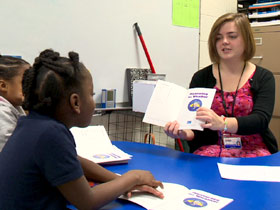 FAW: In this poor neighborhood, where reading scores are abysmally low, Katelyn Woodard praises her students for trying to find the right answer.
FAW: In this poor neighborhood, where reading scores are abysmally low, Katelyn Woodard praises her students for trying to find the right answer.
KATELYN WOODARD (Teacher, Hanley Elementary School, speaking to students): It’s by itself beautiful. Good job, Demetria.
Students: Good job, Demetria!
FAW: Katelyn, Erin, and Kristin are graduates of MTR—Memphis Teacher Residency, a three-year-old program designed to give poor inner city students the same opportunities as students in wealthier areas. David Montague is the director of the school.
DAVID MONTAGUE (Memphis Teacher Residency): It’s absolutely an injustice, because there’s such a large academic achievement gap between students that are generally poor and minority relative to students who generally live in the suburbs and who are white.
FAW: Funded mostly by foundations and private contributions, this program takes college graduates and gives them housing, training, and tuition, even awards them a master’s degree. In return, they agree to teach in an inner city school here for four years. The program is faith-based.
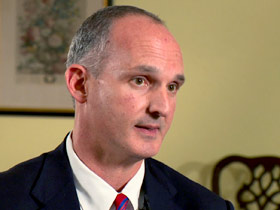 MONTAGUE: What we’re doing here we’re doing within a Christian context. We believe in God’s word as revealed in Scripture, and that faith informs how you think about students. It informs your efficacy. It informs your belief that every child can learn.
MONTAGUE: What we’re doing here we’re doing within a Christian context. We believe in God’s word as revealed in Scripture, and that faith informs how you think about students. It informs your efficacy. It informs your belief that every child can learn.
FAW: There is something about this work that draws people of faith. Erin, for example, planned a career as a hospital pharmacist until her faith made her decide otherwise.
SVOBODA: I feel like this is absolutely where God wants me to be. I had much different ambitions for my life and much different aspirations. But I feel like the Lord kept putting this in my path.
(speaking to students): Remember what this page is called? What’s this page called?
FAW: Katelyn also sees what she is doing in the classroom as a kind of ministry.
WOODARD: How I want to live out my faith in the classroom is by constantly looking at the Lord and looking at how he deals with the world and reflect that in my classroom. If I treat them with that respect and that love that I really believe the Lord has for everyone, then they feel that.
FAW: Is there any such thing as an unteachable child?
SVOBODA. No.
FAW: To these teachers their students are not potential dropouts, but God’s creatures.
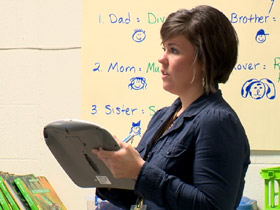 CORNWELL: I’ve seen kids who everyone said, “There’s no way. There’s no way that child is going to be successful.” And I’ve seen them overcome that when someone believes in them, when someone takes the time to sit with them and work with them and pull the assets that we can see from them, and they start to believe, “I can do this.”
CORNWELL: I’ve seen kids who everyone said, “There’s no way. There’s no way that child is going to be successful.” And I’ve seen them overcome that when someone believes in them, when someone takes the time to sit with them and work with them and pull the assets that we can see from them, and they start to believe, “I can do this.”
MONTAGUE: What we still have particularly in urban education is what some people often call soft racism or soft bigotry, which is this idea of teachers at times having very low expectations of their students because of the race or class that they come from. So what we’re trying to do is say absolutely every single child can learn, and we’re going to have very, very high expectations for those children.
FAW: In this school, presided over by principal Rosalind Davis, the teachers from MTR have already had a huge impact.
ROSALIND DAVIS (Principal, Hanley Elementary School): They’ve changed the culture of the school. Their approach to the work, their work ethic, and their strategies, the way they interact with the students.
FAW: Because, says Davis, these teachers with strong faith bring something many other teachers often lack.
DAVIS: Sometimes what’s missing from a teacher’s belief system is a belief that something supernatural and miraculous could happen in schools. They might get knocked down one day, but they come back fighting the next because they prayed about it, they reflected and, you know, they get up.
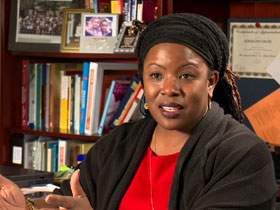 FAW: Don’t be misled. The MTR program is not some roundabout way to impose doctrine, much less to proselytize, as Montague explains.
FAW: Don’t be misled. The MTR program is not some roundabout way to impose doctrine, much less to proselytize, as Montague explains.
MONTAGUE: If you do a Bible study, and you explain why Jesus is the son of God and the only way to heaven, what you’re doing is you’re creating a very unhealthy and non-safe environment for every child in that classroom that doesn’t come from a Christian family, okay, and so you’re inhibiting your children, your students from being able to learn.
SVOBODA: I might not be able to necessarily tell them that I believe that they’re God’s children and that he loves them, but I’m trying to show that love to them.
DAVIS: Your faith isn’t something that you walk around beating people on the head with. People should be able to tell that you’re a Christian without you saying a word.
FAW: It is grindingly difficult work. Children coming here test well below students in more affluent areas. What is accomplished in the classroom is often offset by what they experience outside. Dealing with all that is a real test of faith.
(speaking to Erin Svoboda): You’re swimming upstream.
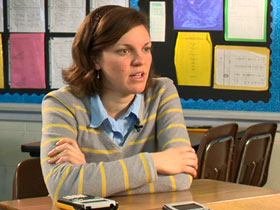 SVOBODA: That’s what it feels like most days, yes.
SVOBODA: That’s what it feels like most days, yes.
FAW: Your faith keeps you going?
SVOBODA: Yes. I will be honest. I don’t know how other people do it. Without that or motivating you have no ideal how anyone would willingly wake up and come to this every day. I don’t mean to make it sound that terrible, but it is hard.
FAW: The program is so new it is hard to measure its success. But test scores are climbing, and students are responding.
(speaking to student): She pushes you?
TEAVIKA JOHNSON: Yes.
FAW: You don’t mind the discipline? You like it?
JOHNSON: No, because it helps me more so I can understand more.
FAW: (speaking to student): The goal up there says 100 percent. So she really inspires you?
WENDY CABAERA: Yes. Actually, for me she is one of our best teachers.
FAW: And if the cynic were to argue that here they can make only the smallest of inroads, that progress will be scant and short-lived; that goals like Erin’s 100 percent target are not likely to be reached—if so, their faith, they insist, will not be diminished.
CORNWELL: I walk here in knowing that I come with my five loaves and two fish, my meager here’s my best that I have, and God’s going to have to multiply that. Whether he chooses to do that now or 20 years from now in urban education, that’s up to him.
WOODARD: What you come to learn through doing this job and through your faith is that there’s a deeper joy and peace and contentment than you could ever imagine that comes from knowing that you’re doing God’s work.
FAW: As they answer a calling and live their faith one student, one classroom at a time.
For Religion & Ethics NewsWeekly, this is Bob Faw in Memphis, Tennessee.

